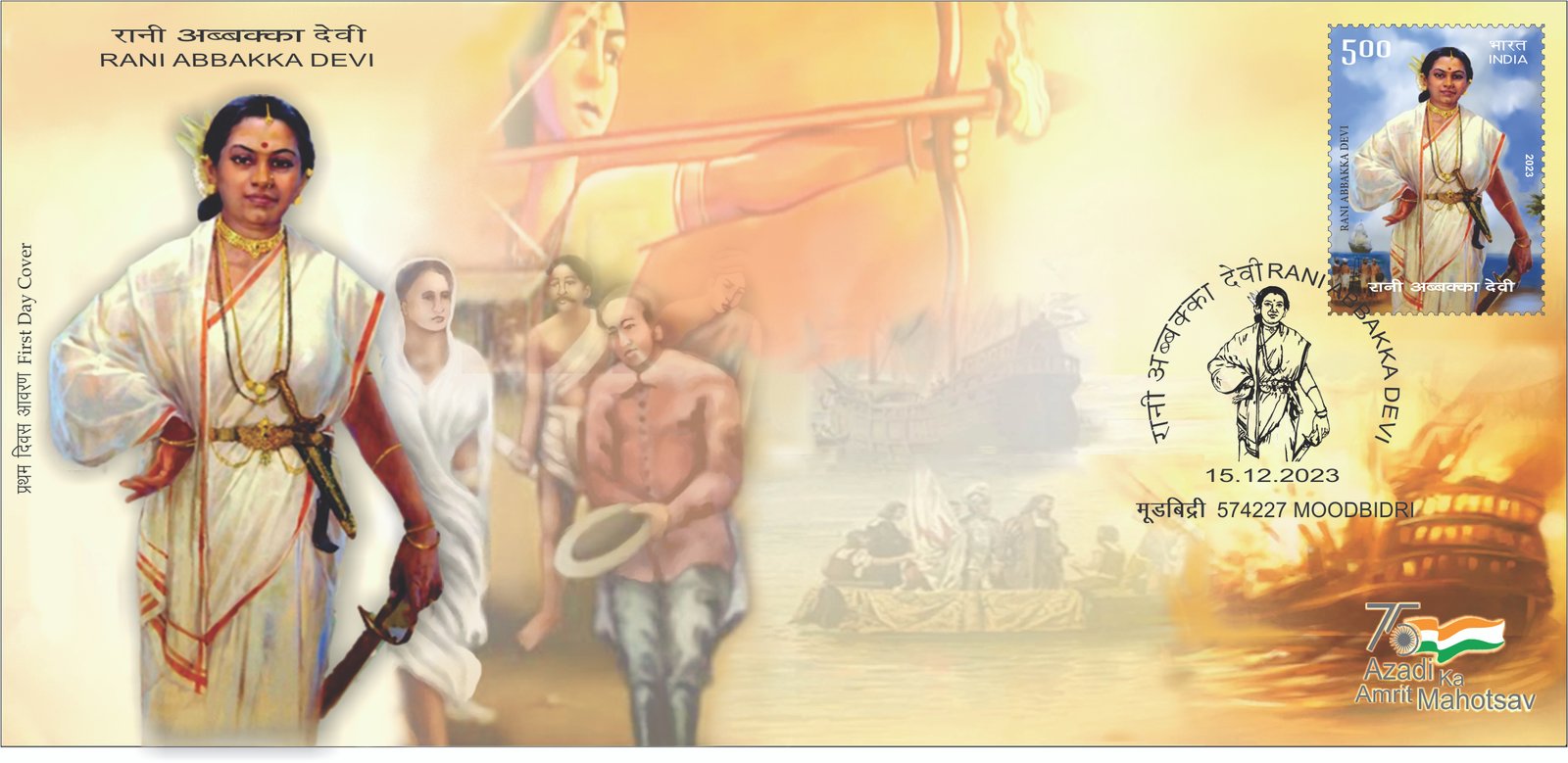Rani Abbakka Devi, Queen of Ullal

Technical Data
| Date of Issue | December 15, 2023 |
|---|---|
| Denomination | Rs. 5 |
| Quantity | 303,200 |
| Perforation | comb 13¾ |
| Printer | Security Printing Press, Hyderabad |
| Printing Process | Wet Offset |
| Watermark | No Watermark |
| Colors | Multicolor |
| Credit (Designed By) | Smt. Vinita Sinha |
| Catalog Codes |
Colnect codes IN 2023.12.15-01 Yvert et Tellier IN 3611 Stanley Gibbons IN 3882 |
| Themes | Commemoration | Famous people | Independency Activists | Queens | Women |
The First Freedom Fighter Against European Powers
Turbulent Times in Tulunadu
The arrival of the Portuguese in the 16th century turned Tulunadu into a hotbed of unrest. Local dynasties such as the Bangas, Ajilas, Chautas, and Sawantas, often in conflict among themselves, now faced a new challenge from the Europeans. The Chautas of Ullal, a Jain dynasty, rose to prominence in the 12th century. Their legacy would later shine brightest through the names of Rani Abbakka Devi, mother and daughter, remembered for their indomitable resistance to Portuguese domination.
The Legacy of the Abbakka Queens
- Elder Rani Abbakka Devi (1554–1588) was married to Kamaraya II of the Banga dynasty.
- Younger Rani Abbakka Devi (1594–1640), her daughter, was married to Lakshmappa Bangarasa IV of the same dynasty.
Both queens were highly skilled in warfare, governance, and diplomacy, earning the love and loyalty of their subjects. While the Banga dynasty eventually yielded to Portuguese power, Rani Abbakka Devi refused to submit, becoming a beacon of resistance.
Defiance Against the Portuguese
The younger Rani Abbakka Devi broke ties with her husband over the issue of paying tribute to the Portuguese. Leaving the Mangalore palace with her three children, she reclaimed the throne of Ullal from her mother and prepared for battle rather than surrender.
The decisive moment came in 1617, when the Portuguese looted one of her merchant ships bound for Saudi Arabia. Enraged, Abbakka launched a fierce counterattack in 1618, with support from Venkatappa Nayaka of Keladi, another opponent of Portuguese power.
Despite her limited forces, Abbakka’s strategy decimated the Portuguese navy, renowned worldwide for its strength. Leaders Miranda and D’Mello narrowly escaped, and the victory sent shockwaves across Europe. From then on, Portuguese interference along the coastal belt waned.
Global Recognition
Rani Abbakka’s fame spread beyond India. In 1623, Italian traveler Pietro Della Valle, inspired by reports of her bravery, visited Ullal to meet the queen. His writings describe her as a ruler of extraordinary courage and wisdom. Historians often note that had Abbakka not repelled the Portuguese, India’s colonial history may have been shaped by Portugal instead of Britain.
A Queen of the People
Rani Abbakka was deeply loved for her justice, governance, and devotion to her subjects. Despite her royal status, she lived simply, dressing like a village woman, riding horses with grace, and dispensing justice late into the night. Her valor and sense of duty earned her a permanent place in the folklore of Tulunadu, celebrated in folk songs, Yakshagana performances, and ritual dances like bootaradhane.
Forgotten Yet Immortal
Though a queen of a small principality, Ullal, Abbakka’s courage and patriotism were unparalleled. She was a precursor to Rani Lakshmibai of Jhansi, fighting nearly three centuries earlier. Yet, while Rani Jhansi has become a symbol of national resistance, Abbakka remains less remembered, despite her historic defiance.
Tribute
The Department of Posts proudly issues a Commemorative Postage Stamp on Rani Abbakka Devi, saluting her valor and bravery. She remains an everlasting inspiration for every Indian, embodying the spirit of resistance, justice, and patriotism.
First Day Cover

